Nestled on the outskirts of Riyadh, Saudi Arabia, Diriyah is an oasis filled with orchards, farms, and fruitful palms. It is also known as "The City of Earth '' due to the mud-brick structures which have been preserved over centuries.
Rooted deep in history, Diriyah is a captivating destination for visitors to learn about culture and traditions while soaking in the lively atmosphere of the area. Strategically located on the banks of Wadi Hanifah, Diriyah is tagged as a world-class cultural suburb for its diverse nature, stunning architecture, seasonal events, folk performances, old markets, and authentic restaurants.
Diriyah was the original, ancestral home of the Saudi royal family. The city was founded in the 18th century and it is where Imam Muhammad bin Saud laid down the foundations of the first Saudi state. This not only impacted the trade and commercials but also the prosperity and growth of human civilization. Moreover, Diriyah holds a strong connection between Bedouin culture and Islamic heritage, which greatly influenced its identity. The impact of Diriyah’s rich historical establishments can still be seen decades later.
Today, Diriyah stands as a UNESCO World Heritage Site, a testament to its enduring legacy and contribution to the kingdom's development. The city comes under the Diriyah Governorate and is a center of political, economic, and cultural significance.
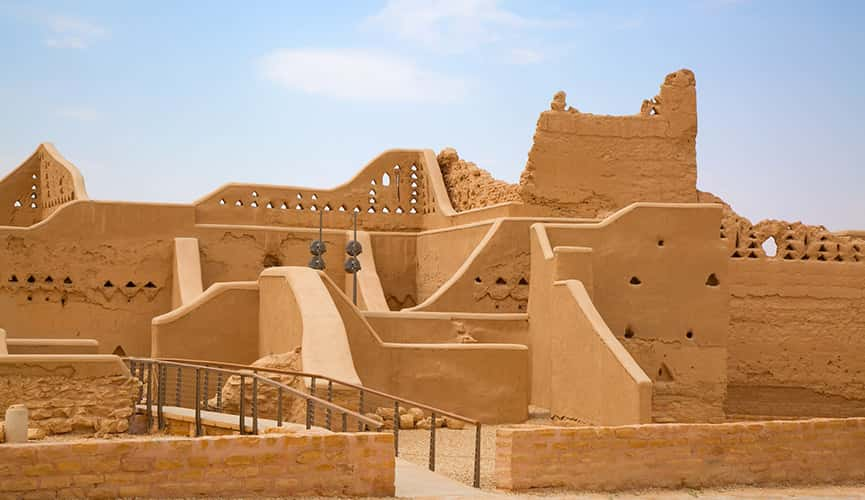
Historically, Diriyah’s establishment dates back to 1446 AD. But today, some of the most important districts in Diriyah are At-Turaif District, Al-Bujairi District, Al-Suraiha District, and Ghasiba District. The At-Turaif district, the first capital of Saudis in Diriyah, was declared a UNESCO World Heritage Site in 2010.
Diriyah is accessible from all over the world. It is approximately 20 kilometers northwest of the capital city of Saudi Arabia, i.e. Riyadh. Most of the time regular flights are available for international visits through King Khalid International Airport but if traveling within Riyadh it is easy to reach the city via Diriyah Metro Station. From the station, visitors can explore the main attractions by foot or by local transportation. Alternatively, cars or taxis are also a convenient option.
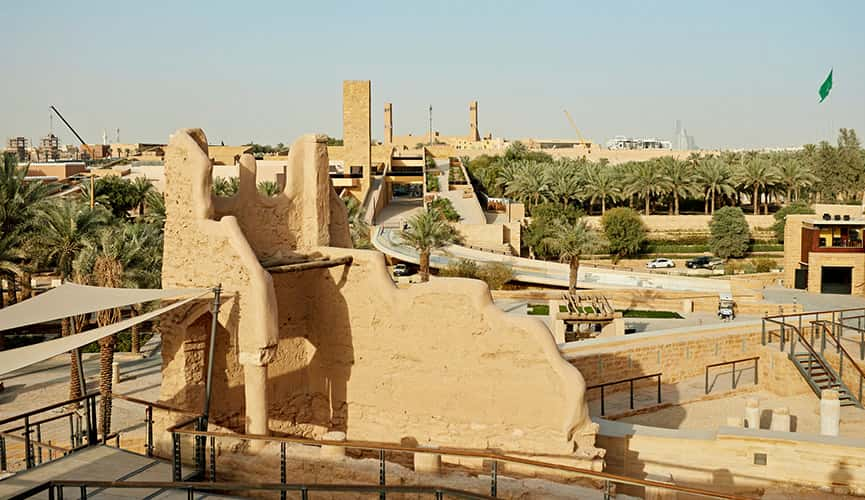
The winter months or spring are the best times to visit Diriyah. Travelers can plan their trip from October to April to enjoy the mild weather and outdoor escapades. During these months, temperature generally ranges from around 15°C to 25°C (59°F to 77°F), perfect for sightseeing and adventure trails.
Diriyah offers a bunch of decent accommodation options. Visitors can find hotels, guesthouses, and even Najdi-style residences, according to their budget and preferences. Alternatively, it is also ideal to book a stay in Riyadh and plan day trips to Diriyah, as the two cities are located nearby.
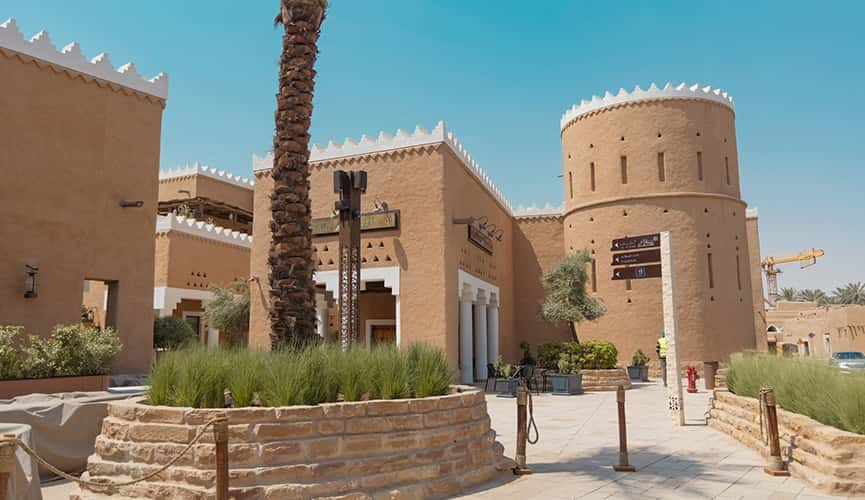
Diriyah holds the essence of Saudi Arabia in such a captivating way that it has been admired by people for centuries. Roaming in the streets of Diriyah is like unfolding a harmonious web of ancient ruins and their stories. It is a place that gives a perfect opportunity to its visitors to travel back in time while keeping with the rich heritage.
The Diriyah city boasts its unique architecture through mud-brick buildings, ornate palaces, and ancient fortresses dotting the landscape. With more and more development in its urbanization, the city flourished as a capital of stability, security, and prosperity. From historic landmarks to its lively neighborhoods, visitors often soak the Diriyah’s warmth through its festivals, local markets, and authentic cuisine.
Every district of Diriyah holds something unique to offer. The mud-brick buildings, historical sites, museums, and mosques are still well-preserved dating back to the 18th century. The At-Turaif is the most important district of Diriyah for its worldwide recognition. Similarly, Al-Bujairi and Al-Suraiha are home to some of the oldest mosques in the city. Here visitors can stroll through old alleys, discover the intricacies of Saudi Arabian architecture, and learn about the historical importance of Diriyah.
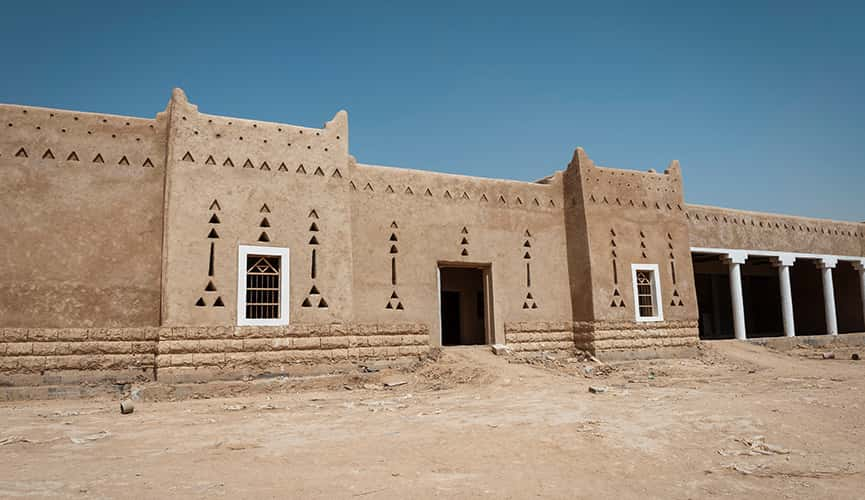
Constructed by Imam Abdulaziz Bin Saud in 1765 AD, Salwa Palace is a standing historical evidence of the old Najdi architectural style. It extends over an area of 10,000 square meters. The Salwa Palace includes many multi-floor residential units and majestic courtyards that represent details through ornate gates and decorative facades. Moreover, travelers can also book a guided tour of Salwa Palace to learn in-depth about its role in Saudi history.
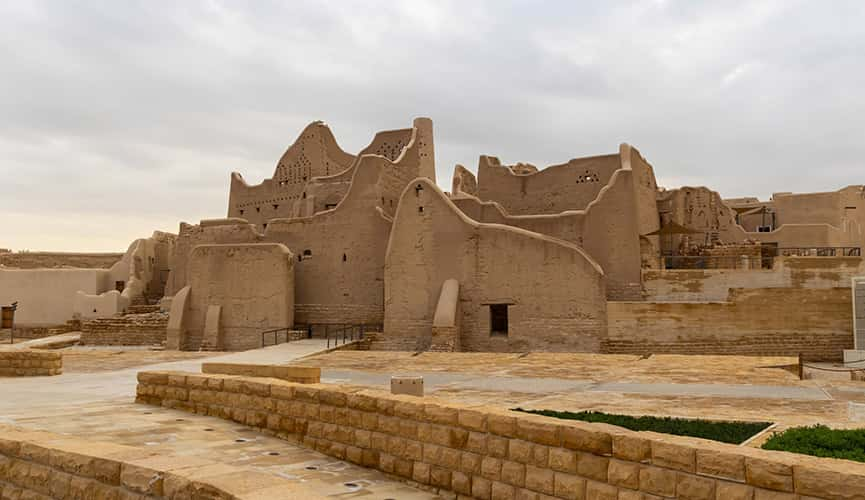
The Al-Bujairi Quarter is the gateway to the historic neighborhood of Diriyah. Visitors can often feel the vibrant and lively vibe of the Quarter through its bustling streets, enjoying the authentic tastes from cafes or restaurants and multi-activity shopping areas to shop traditional handicrafts and souvenirs. From the cultural elements to the modern frameworks the Al-Bujairi Quarter is a true testament that connects the past and present.
Diriyah boasts several museums like the Social Life Museum, Traditional Architecture Museum, Museum of Treasury (Beit al-Maal), Horse Museum, and Military Museum. Filled with old tales and legend contributions, all of them offer a unique flashback into the past through preserved artifacts like war weapons, architectural marvels like mud houses, and paintings documenting history. Visitors can also take part in annual festivals and live performances to get a closure of Diriyah’s golden past.
Diriyah Oasis is an open-air entertainment spot blending cultural aesthetics with contemporary architecture and technology. Surrounded by lush green palm trees, it was built in only 52 days and is a hub of vibrant festivals, entertainment options, and dining delights. The well-developed pathways, soothing ponds, and spacious gardens make it a perfect spot for family picnic time or a solo retreat. The Diriyah Oasis is like a mini city, presenting an immersive experience with the elements of a medieval city.
The list doesn’t end here, Diriyah also offers natural beauty scenes with some of the popular attractions including the Wadi Hanifa, At-Turaif World Heritage Site, Buraiji Heritage Park, Mosim Park, and the recently opened Bujairi Terrace. There are also many mosques including the Imām Muḥammad bin Saʿūd mosque, mosque of al-Zawiharah, mosque of al-Sarikhah, and mosque of Nakhil al-'Dhibah.
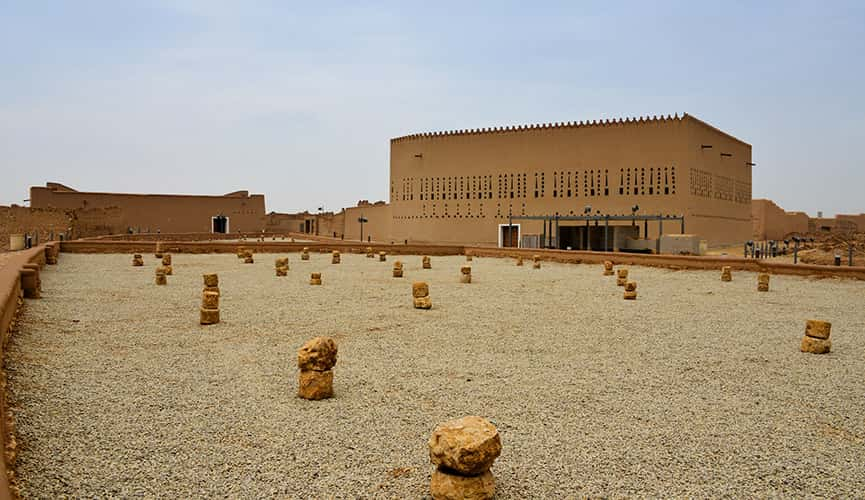
It is impossible to leave Diriyah without sampling its local cuisine. Inspired by various regions, it offers a diverse culinary scene. Diriyah caters to unique tastes and flavors, satisfying almost every taste bud and preference.
The most common local dishes include Mandi, Kabsa, and Shawarma. Visitors can hop around to find any local food cart or even restaurants and eateries offering traditional Saudi cuisine as well as international fare.

For visitors, exploring Diriyah is like stepping into a beautiful blend of traditional Bedouin customs with modern influences. A trip that becomes a forever historical reminder!
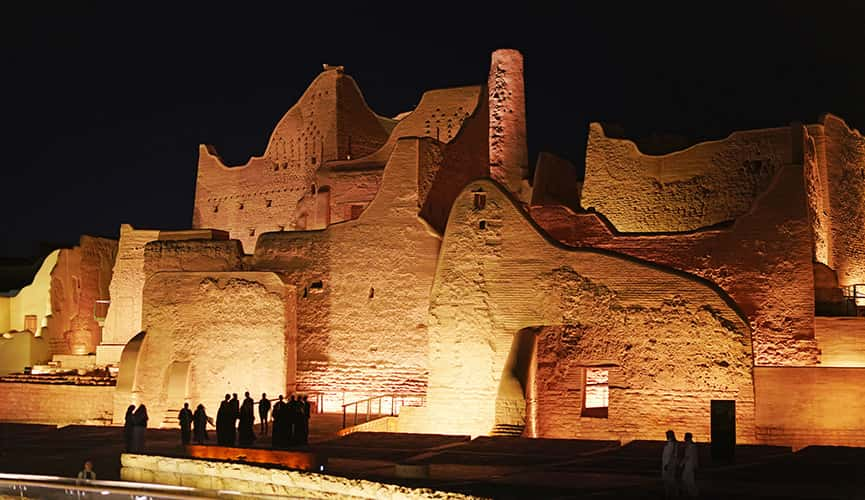
Find Related Tours


© Copyright 2024 Go Saudi Arabia Trips. All Rights Reserved.